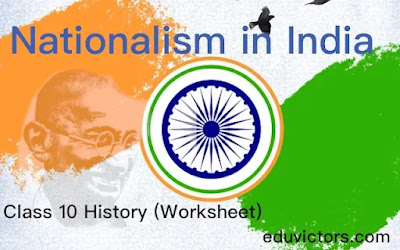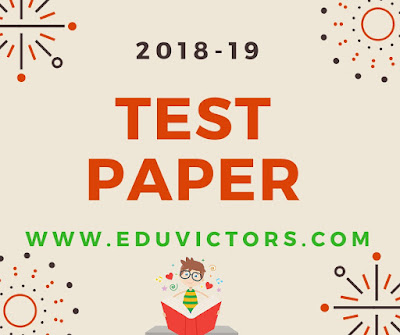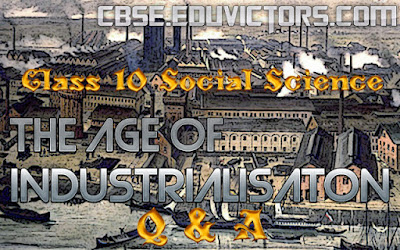Blog provides NCERT solutions, CBSE, NTSE, Olympiad study material, model test papers, important Questions and Answers asked in CBSE examinations. References to Educational Sites and resources.
Sunday, 10 August 2025
Quit India Movement (August Kranti Diwas): A Defining Chapter in India’s Freedom Struggle
Quit India Movement
Thursday, 30 December 2021
CBSE Class 10 - History - Nationalism in India (Worksheet) #Nationalism #class10History #cbse2022 #eduvictors
CBSE Class 10 - History - Nationalism in India (Worksheet)
Fill in the blanks with suitable words.
1. The First World War was started in year ______ and ended in year ______.
2. In 1919, an act was passed by Imperial Legislative Council without the support of Indian members. The Act gave enormous powers to the government to repress political activities and allowed the detention of political prisoners without trial for two years. We are talking about ________ act.

Sunday, 28 November 2021
CBSE Class 10 Social Science - Worksheet (Term 1) #eduvictors #class10SocialScience #cbseTerm1
CBSE Class 10 Social Science - Worksheet (Term 1)
Fill in the blanks
Chapter: Resources and Development
1. Human beings, Fisheries, Flora and Fauna, etc. are obtained from biosphere, are called __________
2. Resources composed of non-living things, e.g.: Rocks, metals, etc. These are called __________.
3. Picnic spots, public spots, etc. that are shared by the public or by a community are called _________.

Saturday, 10 July 2021
CBSE Class 10 - History - The Rise Of Nationalism in Europe ( Questions - Answers)(#class10SocialScience)(#class10History)(#eduvictors)(#cbsenotes)
CBSE Class 10 - History -
The Rise Of Nationalism in Europe
( Questions - Answers)
Q1: Define nationalism.
Answer: The expression of Nationalism was brought about by the French revolution in 1789. Nationalism developed a sense of common identity and shared past or descent. Political movements and struggles by the leaders led to the current commonness. It emerged as a force to unify people which later led to the emergence of the nation-state.
Q2: Who was Frederic Sorrieu?
Answer: He was a French artist famous for a series of four prints prepared in 1848 that visualised the dream of a world consisting of ‘Democratic and Social Republics’.

Tuesday, 22 September 2020
CBSE Class 10 - History - NATIONALISM IN INDIA (MCQs-2)(#nationalismInIndia)(#class10History)(#eduvictors)
NATIONALISM IN INDIA (MCQs-2)
CBSE Class 10 - History
Directions: Read the questions carefully and pick up the correct choice.
Q1: Which of the following is true with reference of Satyagraha?
(Ⅰ) It emphasized muscle power
(Ⅱ) It emphasized the power of truth
(Ⅲ) Gandhiji successfully fought the racist regime of South Africa with the novel method.
(a) Only Ⅰ is true
(b) Only Ⅱ is true
(c) Both Ⅰ and Ⅱ are true
(d) Both Ⅱ and Ⅲ are true
Q2: At which place congress session of September 1920 held.
(a) Nagpur
(b) Calcutta
(c) Lahore
(d) Madras

Sunday, 15 March 2020
The Rise of Nationalism in Europe - CBSE Class 10 - Social Science - MCQs (#eduvictors)(#class10SocialScience)
The Rise of Nationalism in Europe - CBSE Class 10 - Social Science - MCQs

Friday, 13 December 2019
CBSE Class 10 - Social Science - History - Chapter: Nationalism in India - Question Bank (2019-20)(#eduvictors)(#class10History)
History - Chapter: Nationalism in India - Question Bank (2019-20)
1. What do you mean by Satyagraha?
2. At which place congress session of September 1920 held.
3. Who was the leader of the Peasant Movements of Awadh?
4. Under which act the Plantations workers of Assam were not permitted to leave the tea garden?
5. Name the leaders who founded Swaraj Party?
6. At which place did Gandhiji make salt out of sea water?
7. Who wrote 'Hind Swaraj?
8. Which incident forced Gandhiji to halt the Non – cooperation movement?
9. Who led the civil disobedience movement in Peshawar ?
10. Who first created the image of Bharatmata?

Wednesday, 11 December 2019
CBSE Class 10 - Social Science - History - The Rise of Nationalism In Europe - Question Bank (2019-20)(#class10SocialScience)(#eduvictors)
History - The Rise of Nationalism In Europe Question Bank (2019-20)
Very Short Answer Type (1 marks) Questions
1. Who was Frederic Sorrieu?
2. Which of the following is true with reference to Romanticism?
3. What was the basic philosophy of the conservatives?
4. Who was count Cavour?
5. Which of the following state lead the unification of Germany?
6. Who hosted the congress of Vienna in 1815
7. What was the main objective of the treaty of Vienna of 1815?
8. Which treaty recognized Greece as an independent nation?
9. At which place was the Frankfurt assembly convened ?
10. “The aim of the Zollverein is to bind the Germans economically in to a nation”. Who wrote these words?

Tuesday, 18 June 2019
History MCQs For Competitive Examinations (#historyQuiz)(#eduvictors)

Tuesday, 11 June 2019
CBSE Class 10 - History - Nationalism in India (MCQs)(#eduvictors)(#class10History)
Nationalism in India
Q1: Why did Gandhiji travel to Champaran?
(a) To meet his relatives
(a) Nagpur Session of December 1927

Friday, 23 November 2018
CBSE Class 10 - All Subjects Sample Question Papers (2018-19) (#cbsepapers)(#eduvictors)
CBSE Class 10 -
Sample Question Papers (2018-19)
By solving the CBSE test papers for class 10, candidates will figure out how to distinguish question paper examples and patterns, answer necessities, kinds of trap questions and the sky is the limit from there. Students are urged to endeavor test question papers inside the predefined time limit. The papers empower them to find the correct technique and answers for ordinarily made questions. They are urged to solve the problems within the recommended time with the goal that they may assess their regions of solidarity and focus on those they are feeble in.
To endeavor board exam understudies require a great deal of training as ridicule tests and test papers that will plan and empower them to compose the Class 10 CBSE Board Examination with certainty. Since it is the main board exam a kid shows up for there is frequently a great deal of fear included. Explaining these example papers supports certainty and mitigates the dread of board examinations that a great deal of students have.
Here are sample question papers on various subjects for class 10 (session: 2018-19) along with answers and marking schemes:

Monday, 5 November 2018
CLASS 10 : SOCIAL SCIENCE - CHAPTER : THE AGE OF INDUSTRIALISATION (Q and A) (#cbsenotes)(#eduvictors)
Answer:
1. Proto-industrialisation refers to that phase of industrialization which existed in Britain before the growth of factories using mechanical power.
2. Industries during this phase were run with the help of human labour.
3. The proto-industrialisation system was controlled by the merchants.
4. Goods were produced by a vast number of producers working within their family farms and not in the factories.
Q2: In the proto-industrialisation period, why was it difficult for new merchants to set up business in towns?
OR
Why did the merchants move to the countryside to set up their business?
Answer: It was difficult for merchants to set up their business in towns because:
1. Urban crafts and trade guild associations were powerful in the towns. They restricted the entry of new people into the trade.
2. Rulers granted different guilds the monopoly rights to produce and trade in specific products.
So the new merchants turned to the countryside.

